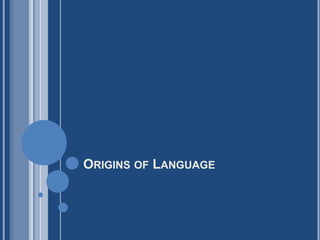Origins of language
•Download as PPTX, PDF•
3 likes•9,453 views
Exercise to go through the origins of language during the Stone Age.
Report
Share
Report
Share

Recommended
Recommended
More Related Content
What's hot
What's hot (20)
Introduction to Linguistics_2 Linguistics, Language and the Origin of Languag...

Introduction to Linguistics_2 Linguistics, Language and the Origin of Languag...
Similar to Origins of language
Similar to Origins of language (20)
An Ancient Hungarian Layer in the English Language

An Ancient Hungarian Layer in the English Language
More from Mr. Finnie
More from Mr. Finnie (20)
Recently uploaded
Recently uploaded (20)
Beyond_Borders_Understanding_Anime_and_Manga_Fandom_A_Comprehensive_Audience_...

Beyond_Borders_Understanding_Anime_and_Manga_Fandom_A_Comprehensive_Audience_...
Food safety_Challenges food safety laboratories_.pdf

Food safety_Challenges food safety laboratories_.pdf
Jual Obat Aborsi Hongkong ( Asli No.1 ) 085657271886 Obat Penggugur Kandungan...

Jual Obat Aborsi Hongkong ( Asli No.1 ) 085657271886 Obat Penggugur Kandungan...
HMCS Max Bernays Pre-Deployment Brief (May 2024).pptx

HMCS Max Bernays Pre-Deployment Brief (May 2024).pptx
HMCS Vancouver Pre-Deployment Brief - May 2024 (Web Version).pptx

HMCS Vancouver Pre-Deployment Brief - May 2024 (Web Version).pptx
ICT role in 21st century education and it's challenges.

ICT role in 21st century education and it's challenges.
Kodo Millet PPT made by Ghanshyam bairwa college of Agriculture kumher bhara...

Kodo Millet PPT made by Ghanshyam bairwa college of Agriculture kumher bhara...
General Principles of Intellectual Property: Concepts of Intellectual Proper...

General Principles of Intellectual Property: Concepts of Intellectual Proper...
Interdisciplinary_Insights_Data_Collection_Methods.pptx

Interdisciplinary_Insights_Data_Collection_Methods.pptx
Python Notes for mca i year students osmania university.docx

Python Notes for mca i year students osmania university.docx
Unit 3 Emotional Intelligence and Spiritual Intelligence.pdf

Unit 3 Emotional Intelligence and Spiritual Intelligence.pdf
Origins of language
- 2. VOICE BOX Your voice box cannot be fossilized but the hyoid bone at the back of the tongue can be found. Neanderthal skeleton has the same bone (60,000 years ago). Archeologists found no difference between their bone and ours. They think the Neanderthal could speak but maybe at a basic level. Some believe that Stone Age humans had some way to talk to each other. This would have allowed people to work more closely together and share culture/knowledge.
- 3. HOW DID LANGUAGE START? What ways can we communicate without using words? Sounds/Tones Hand Gestures Body Language Facial Expressions Simple words to develop things, do not develop conjunctions/adjectives
- 4. LANGUAGE EXERCISE Come up with 5 key words for the situation given to your group. Develop a sound for them and use the other means of communication to tell your message. Communicate them to the class. What challenges did you have? What challenges would there have been between different groups during the Stone Age? What do you notice about language today? Differences/similarities?
- 5. LANGUAGE Many words are shared by various languages throughout the world. Most are surrounded around the conditions and environment of early people. Snow, winter, bear, horse, dog, and snake are all words found to be common in Indo-European languages. On the other hand there are no common words for elephant, camel, bamboo, tiger, etc. We might think of these languages as tribes who moved away from the main original family and set up home in different parts of Europe.
- 6. LANGUAGE Some languages are related Does not mean that you can understand each other, but they will have some words in common. Modern English: combines French and Old English (Latin and Scandinavian) making it both Italic and Germanic. English is a „mongrel‟ language because it continues to adapt, other languages try to keep out foreign influences
- 7. INDO-EURO LANGUAGE CLASSIFICATIONS Germanic: Low German, Old Norse, Anglo-Saxon, Old English, Frisian, Flemish, Dutch, German, Icelandic, Norwegian, Swedish, Danish Celtic: Breton, Manx, Scots Gaelic, Irish Gaelic, Welsh Italic: Latin, Romanian, French, Portuguese, Spanish, Italian Hellenic: Classic/Modern Greek Balto-Slavonic: Lithuanian, Russian, Serbo-Croat, Polish, Czech Indo-Iranian: Hindi, Punjabi, Bengali, Romany, Sanskrit
- 8. THE SALMON Salmon was a plentiful/nourishing source All along rivers going from Baltic to North Atlantic It still lives in Russia, Scandanavia and Baltic areas and is known as “laks” Celtic people don‟t use that phrase, branched off and gave a new name replacing the original English word for salmon derives from the Latin word for „leap‟ Spanish use “salmon” where the Portuguese use “salmao” The word “lax” or “leax” does appear before 1300 in Old English but “salmond” appears in 1488 It has fallen out of use in Greece (no salmon) but the Turks use the word to refer to „fish‟ in general
